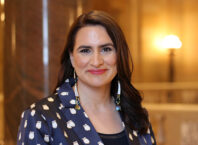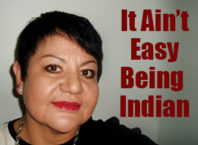By Nick Metcalf
This month, I’d like to write about an issue that I’ve been trying to figure out how to write about it. I’ve lived and/or worked in Phillips Neighborhood in South Minneapolis for 22 years and it has changed. What has historically been the heart of the Native community in Minneapolis has changed. There is a large number of African people settling into the neighborhood.
Let’s start here with an Oxford dictionary meaning: Xen-o-pho-bi-a, NOUN – intense or irrational dislike or fear of people from other countries.
I sat with this issue for a while now. I wanted to make sure my perspective was not xenophobic. After thoughtful reflection and prayer, I’ve come to this conclusion – I don’t know enough about our new neighbors to have an intense fear. I truly want to know more. I’d like to figure out a way that we can coexist in our community together. I’d like them to know the truth about our histories and our stories. We really do have more in common than we don’t.
I was going to title my column this month, “How Neighborhood Revitalization, a Refugee Crisis, and White Liberals changed the heart of the Minneapolis Native community, for better or worse, To Be Determined (TBD).” I chose not to because it was filled with judgment. As with my other columns, I want to explore a topic and encourage conversation.
I’d like to encourage you to walk down the street in South Minneapolis and you’ll see how it’s changed. I’d like to suggest that you shop in the Phillips neighborhood and you’ll get a sense of how much it’s changed. When I moved here in 1994 the neighborhood was filled with Native businesses, agencies, and faces – Anishinabe, Dakota, Lakota, etc. Back then Native people filled this neighborhood.
I’ve learned by listening to the stories and being a part of this community that many of the Native people in the neighborhood were part of the US Indian Relocation Act of the 1950’s. Many of the families moved here and stayed. There exist several generations of urban Natives that maintain this vibrant community. Heck, AIM began here and a call to Native activism was and is still born here.
Now, I walk out in my neighborhood and see beautiful African faces. Women wearing hijabs. Men dressed in formal American clothes or ajabari. Oftentimes, I see their wide eyed wonder. It’s exciting to see people find a home here. Yet, under all of this mixing is confusion.
I often wonder what Africans are told about Native Americans during their transition here. I am beginning to get a sense that what they are learning isn’t good. I suspect they are taught the ugly American ideas about Native people.
One day, as I shopped, a little African kid tried to kick me. The Mother didn’t stop him. She said something to her son in their native tongue, but that didn’t stop him from give me a disgusted look. Lately, as I grocery shop, the African women are more openly rude to me when I’m there. The African men assume I’m a woman with my long hair, then upon their discovery give me stank face then loudly groan their unhappiness.
In my conversations with the African cab driver, I’ve learned they don’t know anything about the Native community they’ve moved into. I’ve stopped smiling at strangers anymore. I’ve tried to befriend Africans, but I’ve not been successful, and it’s confusing because I’m a pretty friendly person.
Yes, Phillips is filled with many, many social service agencies, nonprofits, and poor people. But what is forgotten is that Native people are still in trauma, or recovering from trauma. Everyday a Native person has to demand, or fight for our own recognition.
Unfortunately, when someone from another country with trauma is introduced into this neighborhood then we accidently bump into each other’s pain, so to speak. A simple interaction that crosses language, values, and beliefs can lead to mistrust and confusion. My boys don’t go to the neighborhood Boys and Girls Club because it’s not a safe place. My boys have to maneuver their way home because the racial tension is thick in the neighborhood.
I’d like to encourage people to learn more about one another. Africans and Native have a lot in common. We are displaced people just trying to find our place. We are tribal people. We have our own customs.
Ultimately, I’d like to see a conversation occur amongst and between the Native community and the African community. But, who is going to start it? Who is expected to begin these conversations? Them? Us?
I love my neighborhood. Ultimately, I’d like our neighborhood be safe place to be; a place where we honor each other; and a place where we respect one another.





